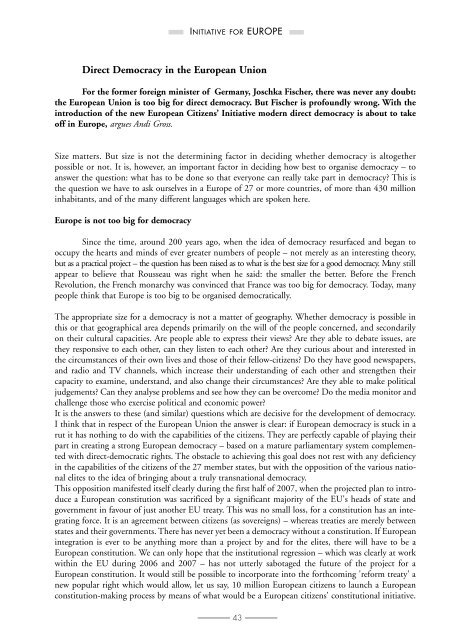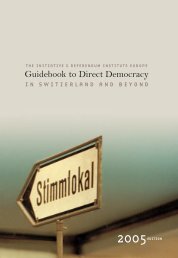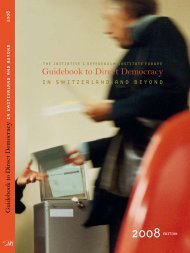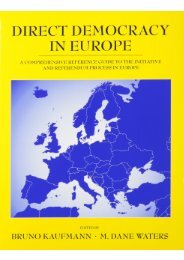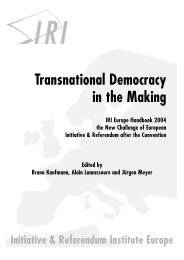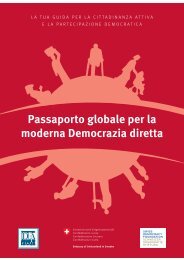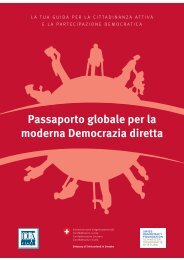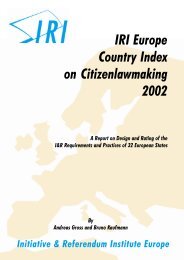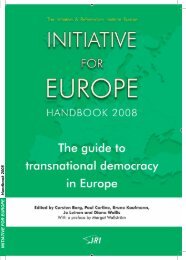Initiative for Europe Handbook 2008
The guide to transnational democracy in Europe
The guide to transnational democracy in Europe
Create successful ePaper yourself
Turn your PDF publications into a flip-book with our unique Google optimized e-Paper software.
INITIATIVE FOR EUROPE<br />
Direct Democracy in the <strong>Europe</strong>an Union<br />
For the <strong>for</strong>mer <strong>for</strong>eign minister of Germany, Joschka Fischer, there was never any doubt:<br />
the <strong>Europe</strong>an Union is too big <strong>for</strong> direct democracy. But Fischer is profoundly wrong. With the<br />
introduction of the new <strong>Europe</strong>an Citizens’ <strong>Initiative</strong> modern direct democracy is about to take<br />
off in <strong>Europe</strong>, argues Andi Gross.<br />
Size matters. But size is not the determining factor in deciding whether democracy is altogether<br />
possible or not. It is, however, an important factor in deciding how best to organise democracy – to<br />
answer the question: what has to be done so that everyone can really take part in democracy? This is<br />
the question we have to ask ourselves in a <strong>Europe</strong> of 27 or more countries, of more than 430 million<br />
inhabitants, and of the many different languages which are spoken here.<br />
<strong>Europe</strong> is not too big <strong>for</strong> democracy<br />
Since the time, around 200 years ago, when the idea of democracy resurfaced and began to<br />
occupy the hearts and minds of ever greater numbers of people – not merely as an interesting theory,<br />
but as a practical project – the question has been raised as to what is the best size <strong>for</strong> a good democracy. Many still<br />
appear to believe that Rousseau was right when he said: the smaller the better. Be<strong>for</strong>e the French<br />
Revolution, the French monarchy was convinced that France was too big <strong>for</strong> democracy. Today, many<br />
people think that <strong>Europe</strong> is too big to be organised democratically.<br />
The appropriate size <strong>for</strong> a democracy is not a matter of geography. Whether democracy is possible in<br />
this or that geographical area depends primarily on the will of the people concerned, and secondarily<br />
on their cultural capacities. Are people able to express their views? Are they able to debate issues, are<br />
they responsive to each other, can they listen to each other? Are they curious about and interested in<br />
the circumstances of their own lives and those of their fellow-citizens? Do they have good newspapers,<br />
and radio and TV channels, which increase their understanding of each other and strengthen their<br />
capacity to examine, understand, and also change their circumstances? Are they able to make political<br />
judgements? Can they analyse problems and see how they can be overcome? Do the media monitor and<br />
challenge those who exercise political and economic power?<br />
It is the answers to these (and similar) questions which are decisive <strong>for</strong> the development of democracy.<br />
I think that in respect of the <strong>Europe</strong>an Union the answer is clear: if <strong>Europe</strong>an democracy is stuck in a<br />
rut it has nothing to do with the capabilities of the citizens. They are perfectly capable of playing their<br />
part in creating a strong <strong>Europe</strong>an democracy – based on a mature parliamentary system complemented<br />
with direct-democratic rights. The obstacle to achieving this goal does not rest with any deficiency<br />
in the capabilities of the citizens of the 27 member states, but with the opposition of the various national<br />
elites to the idea of bringing about a truly transnational democracy.<br />
This opposition manifested itself clearly during the first half of 2007, when the projected plan to introduce<br />
a <strong>Europe</strong>an constitution was sacrificed by a significant majority of the EU's heads of state and<br />
government in favour of just another EU treaty. This was no small loss, <strong>for</strong> a constitution has an integrating<br />
<strong>for</strong>ce. It is an agreement between citizens (as sovereigns) – whereas treaties are merely between<br />
states and their governments. There has never yet been a democracy without a constitution. If <strong>Europe</strong>an<br />
integration is ever to be anything more than a project by and <strong>for</strong> the elites, there will have to be a<br />
<strong>Europe</strong>an constitution. We can only hope that the institutional regression – which was clearly at work<br />
within the EU during 2006 and 2007 – has not utterly sabotaged the future of the project <strong>for</strong> a<br />
<strong>Europe</strong>an constitution. It would still be possible to incorporate into the <strong>for</strong>thcoming 're<strong>for</strong>m treaty' a<br />
new popular right which would allow, let us say, 10 million <strong>Europe</strong>an citizens to launch a <strong>Europe</strong>an<br />
constitution-making process by means of what would be a <strong>Europe</strong>an citizens' constitutional initiative.<br />
43


